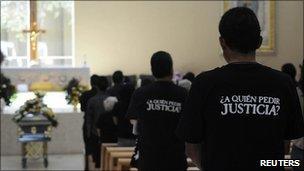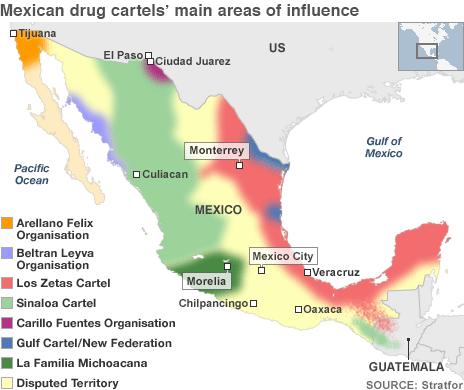Mexico paper seeks Ciudad Juarez drug gang guidance
- Published

Journalists and many others in Ciudad Juarez are unsure where to seek justice
A Mexican newspaper in the heartland of the country's drug war has asked cartels for guidance on whether it should publish stories on the conflict.
El Diario de Juarez has become known for its strong reporting from the deadly streets of Ciudad Juarez.
But the killing of a 21-year-old photographer last week prompted the newspaper to run a front-page editorial asking: "What do you want from us?"
Rights groups say journalists are regularly being targeted by drug gangs.
The Committee to Protect Journalists, a US-based advocacy group, says more than 30 journalists have been killed in Mexico since 2006.
Many of those killed were reporting on crime or corruption, the group says, adding that the climate of fear has led to a widespread culture of self-censorship among fearful media workers.
'No surrender'
El Diario's editorial, published on its front page on Sunday, external, was its second since Luis Carlos Santiago, 21, was shot in Ciudad Juarez on 17 September. He later died of his injuries, although an intern who was also shot, Carlos Sanchez, survived the attack.
"The loss of two reporters from this publishing house in less than two years represents an irreparable sorrow for all of us who work here, and, in particular, for their families," the newspaper said.
Describing the drug lords as the "de facto authorities" within Ciudad Juarez, the newspaper asked the cartels: "We ask you to explain what you want from us, what we should try to publish or not publish, so we know what to expect."
It highlighted the lack of progress in the investigation into the 2008 death of Armando Rodriguez, shot dead outside his home in view of his family.
But the editorial insisted it was not "a surrender", saying instead that it had simply become "impossible to do our job in these conditions".
Speaking to BBC World Service an editor at El Diario, Gerardo Rodriguez, said there was a war going on in Mexico that the journalists did not ask for. He expressed anger at the lack of progress in the official investigation into Mr Rodriguez's death and criticised the government as well as the cartels.
"We are looking for a peace agreement. No story is worth the life of anyone anymore."
The newspaper had not decided to stop publishing stories on the drug war, Mr Rodriguez said, but would consider doing so if the answer that came from the cartels indicated that was their wish.
Describing El Diario as a "very aggressive" organisation that "searches for the truth", he conceded that the paper might have to scale back its work if the violence did not stop.
"We may consider stopping in exchange for the lives of our reporters."
Rising violence
Carlos Lauria, of the Committee to Protect Journalists, said El Diario's decision was a cause for regret.
"Even in one of the places where violence is worst... El Diario was still doing a lot of good reporting on crime," he told the Associated Press, describing the paper's move as "an indication that the situation is out of control".
Ciudad Juarez is one of the deadliest flashpoints in Mexico's drug battles, which have seen violence rise sharply in the country's north in recent weeks.
Opposition groups say a government crackdown on cartels, which began three-and-a-half years ago, has done nothing to stop the flow of drugs to the US.
More than 28,000 people have died in drug-related violence since President Felipe Calderon deployed the army against the cartels in 2006. The violence has spilled over into Central America.
However, the president has defended his policy, saying that the rise in violence is a sign that the cartels are becoming more desperate.

- Published14 September 2010